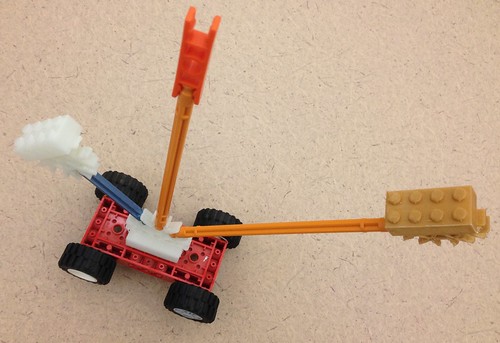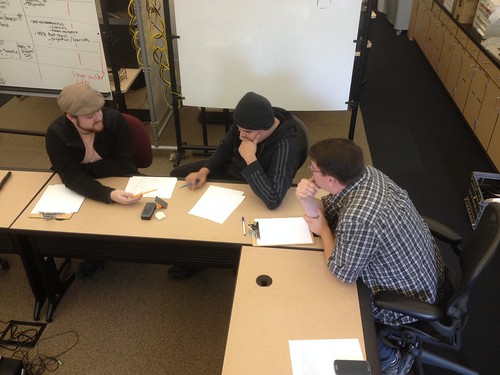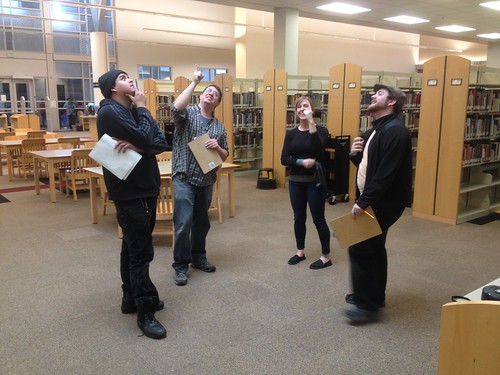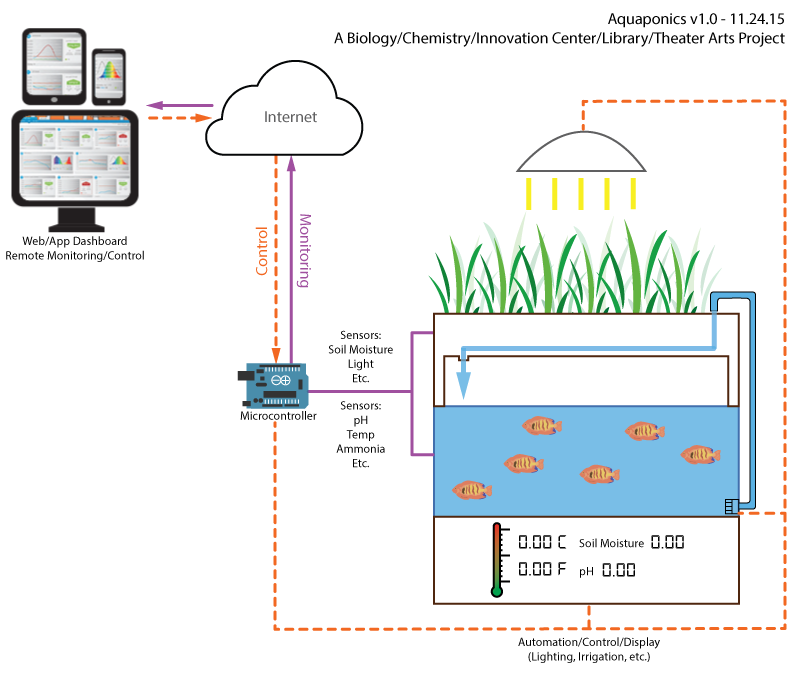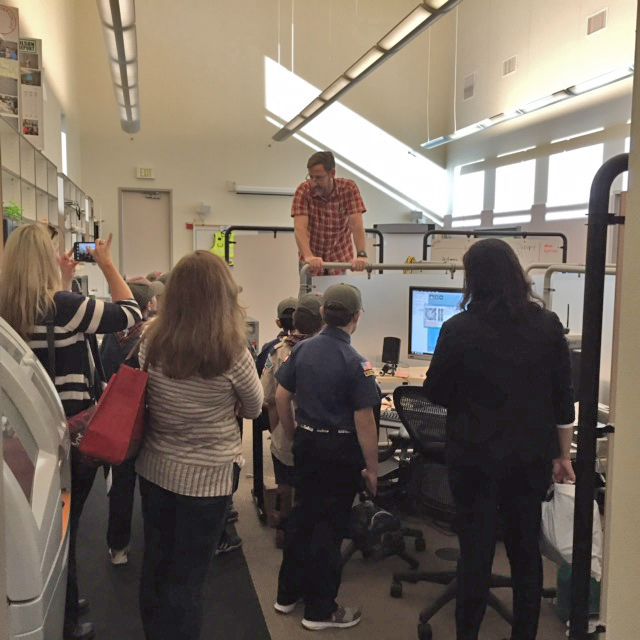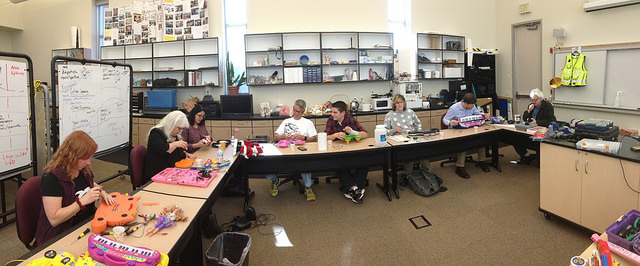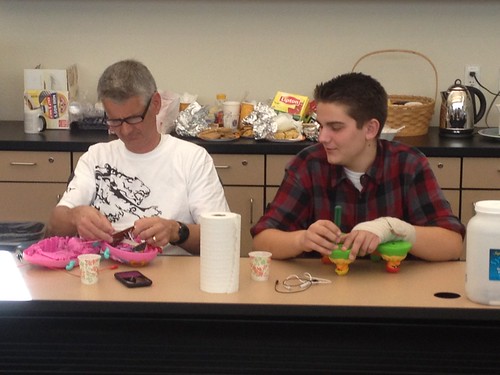- D2L, Canvas, and the OEI
- FLC DE Planning
- NMC Horizon Report 2015 (http://cdn.nmc.org/media/2015-nmc-horizon-report-HE-EN.pdf)
-
“When assessing the quality of courses, researchers pinpointed clarity, authenticity, unity, suspense, economy, depth, proportion, vividness, brilliance, sensitivity, emphasis, authority, flow, and precision as the ultimate benchmarks.”
-
Professor Jennifer Kraemer (Early Childhood Education) and I recently collaborated on a lesson plan to use 3D printing in the ECE classroom. Specifically, the project uses the Free Universal Construction Kit, a set of printable interfaces that bridge 10 common proprietary building systems including Lego, Lincoln Logs, Tinkertoys and K’NEX.
The full lesson plan can be found here: https://docs.google.com/document/d/1GVfIXhJFxgTq3lA5-n3uwT9XyLTdKMayLcqPaE36VCc/edit?usp=sharing
We hope to test it out in ECE 342 – Constructive Math and Science in Early Childhood Education.
The Aquaponics Project is taking shape. Met today with Professor Ian Wallace and students from the Theater Arts program to talk about the requirements for installation.
The tentative plan has TA students welding the base, and then skinning it with wood, resplendent with infographics carved using their ShopBot setup. Amy Brinkley (Librarian) moved some furniture this morning to make room for the installation, so we all went out and talked through the project in its natural habitat, kicking around ideas about lighting, associated displays of library materials, and design elements. Students Cameron and Carlos will be working on some conceptual drawings and models so we can move forward in January!
Students aren’t able to see their Final Calculated Grade until you release it.
To Release D2L Final Grades to Students:
1. From Grades -> Manage Grades -> Enter Grades (in the dropdown menu next to Final Calculated Grade)

2. At the top of the screen, Final Grades -> Release All – the creepy, unblinking, all-seeing eye.

Note – If you have any Bonus items in your gradebook, and they belong to a category – for instance, an Extra Credit category – be sure that category is set up with “Can Exceed” checked, else the math won’t work out.
- Update on LMS Work Group
- The LMS Work Group derives its authority from LRCCD R-7145 (see 4.1.1 http://losrios.edu/legal/Regulations/R-7000/R-7145.pdf). FLC is being represented on the work group by Zack Dowell, Gary Hartley, Jennifer Kraemer and Ian Wallace. Zack Dowell is also the LRCFT representative on the work group.
- At the first meeting of the work group, the body decided to look at Instructure Canvas not in a vacuum, but within the larger context of the Online Education Initiative, which includes a suite of free and reduced-cost services, including tutoring and support (see https://drive.google.com/file/d/0B1HizVK87qvsbHZvUGRVOVBPNHc/view?usp=sharing).
- The committee is currently reviewing “DRAFT Los Rios LMS Selection Criteria” (https://drive.google.com/file/d/0B1HizVK87qvselY0Q0VZMzlZSkU/view?usp=sharing) which will be used to evaluate Canvas.
- Update on DE Subcommittee of Curriculum
- Lightboard example: https://youtu.be/ZR-hf-KJ0_4
- Other topics of interest
The Innovation Center hosted its first Circuit Bending workshop today. Following a short introduction, folks tore apart electronic toys and made joyful noise! Gallery of photos:
- LMS Workgroup
- Criteria
- DE Subcommittee DE Planning
- DRAFT Vision Statement:
- The College is committed to ensuring quality education, effective support services, and accessible learning materials in its distance education courses and services as it does in all of its courses and services.
- The learning outcomes and rigor of distance education offerings are the same as those of traditional offerings.
- Through distance education, Folsom Lake College strives to expand the delivery of quality education by:
- utilizing technology to create an educational opportunity that is independent of time and place,
- expanding access for students challenged by distance and schedule,
- increasing accessibility for students with physical limitations,
- enabling students who prefer to learn through alternative instructional methods,
- supporting faculty innovation,
- integrating distance education into the existing college processes, systems, and structures,
- ensuring that the Distance Education infrastructure is capable of supporting online degrees and certificates.
- The College is committed to ensuring quality education, effective support services, and accessible learning materials in its distance education courses and services as it does in all of its courses and services.
- Canvas Update
- Zoom?
Friday, November 13
1-3 PM in FL1-130 (Innovation Center)
RSVP
No experience necessary! Circuit bending is a fun, easy, and low-stress way to explore circuits and electronics, and you don’t need to know much about either to successfully create unique musical instruments.
What to bring:
- A couple of (working) electronic toys to eviscerate. Cheap keyboards and other toys that sing or talk or make noises (battery operated only) can be found at thrift stores for just a few dollars. Goodwill in Folsom has lots of castoff, inexpensive electronic noisemaking toys, fairly begging to be transformed (upcycled?) into one-of-a-kind mechanisms of sound art. Don’t forget the batteries!
- A small Phillips screwdriver. Precision screwdrivers (the really small ones) are often useful, and needle nose pliers sometimes can be helpful.
- A willingness to explore, tinker, and be creative.
We’ll have some electronic toys, batteries and tools you can borrow if you forget something.

